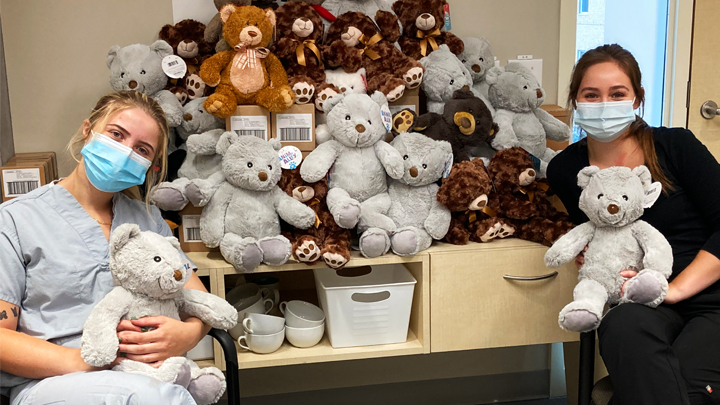
September 17, 2020

Reagan Broadhurst, left, and Skye Murk, friends and service workers, show off some of the bears they collected in support of the Bereavement Program at the Lois Hole Hospital for Women.
Story by Sharman Hnatiuk | Photo by Shelley Broadhurst
When Reagan Broadhurst and Skye Murk heard the call from the Bereavement Program at the Royal Alexandra Hospital’s (RAH) Lois Hole Hospital for Women (LHHW), the co-workers and friends stepped up to organize a heart-warming contribution for patients in need of emotional support.
Teddy bears are a part of a memento program for parents and family members who have experienced a pregnancy loss — no matter the gestation, stillbirth or neo-natal death — at the hospital. The memento is offered to parents, siblings and extended family such as grandparents, to help honour and recognize their loss.
“For some, the bears can help fill the empty arms of families impacted by pregnancy and infant loss leaving our hospital,” says Patti Walker, Regional Bereavement Coordinator, LHHW.
“A bear can’t replace the baby a family planned to take home, but it may give them something to hold on to that represents part of their loss.”
The program relies on the generosity of the public to offer the memento. Typically, new bears are donated by families who have experienced a loss, and provided the opportunity to extend their condolences on special handmade tags from the bereavement program.
Due to COVID-19, however, the annual teddy bear drives held in conjunction with annual bereavement events since March have been suspended. So the program put out a call to staff to help replenish the dwindling stock of bears.
Broadhurst and Murk, service workers in the LHHW and Stollery neonatal intensive care unit at the RAH, joined forces to organize a teddy bear drive to support the program.
“Through social media and by reaching out to friends and family we spread the word that we could collect the bears at our homes,” says Broadhurst. “People were happy to drop off donations, and in just two weeks we got more than 250 new bears to donate to the bereavement program.”
For Walker, who meets with families impacted by pregnancy and infant loss at the LHHW, the fact that the two organized a teddy bear drive is overwhelming.
“To have two young girls see the value in the memento of a teddy bear to a grieving family, and to organize a drive as they did, warms my heart,” says Walker.
“This donation helps ensure that if a family needs a bear, we can give them one.”